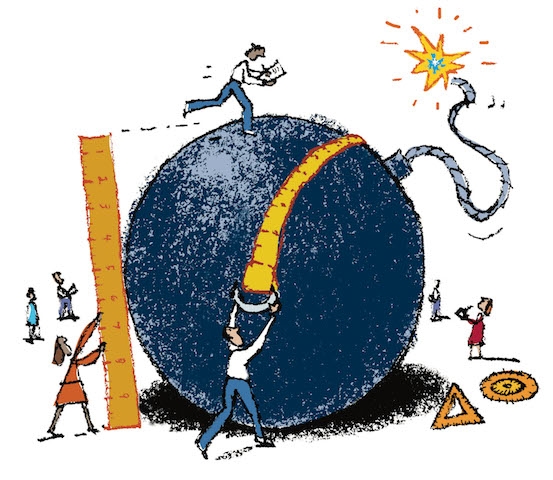True Detectives
| by Eva Gudbergsdottir

They have been called the “Detonation Detectives” for their investigations into the weapons of mass destruction programs around the world. The work of Jeffrey Lewis, Melissa Hanham, and their colleagues at the James Martin Center for Nonproliferation Studies - deciphering satellite images and examining every detail of official photographs and videos, as well as unclassified data, to learn more about what is really going on in North Korea - has garnered a lot of media attention recently. We learned that five minutes is just scratching the surface with them.
Q: When did you become “detectives”?
Melissa: I graduated with a degree in international security policy in East Asia and I was a recent hire at the International Crisis Group in their Seoul, South Korea, office. A missile had been launched near a village called Musudan. I decided to find the village, and, thanks to Google Earth, I did. I found out that what a missile pad might look like, and then I started searching. Using Google, I found a satellite image of the pad with the missile still on it. It was like magic.
Jeffrey: I was writing my dissertation. It was about China’s nuclear forces. The Chinese don’t publish a lot of detailed information, but there are a lot of historical accounts with great qualitative descriptions of what they did. But it hard to put numbers on that stuff. So I got interested in looking at scientific papers or satellite pictures of facilities, or I would visit sites in China and take measurements of missiles in museums just to get the quantitative information that I needed to make sense of the qualitative stuff I had.
Q: Why do you think it is important for private citizens, or people like you, to do this work? Why not leave it up to governments?
Jeffrey: The reason I got into this topic was the frustration I had with the government in the run-up to the Iraq war. There was a lot of “they’re doing these terrible things, trust us.” And there wasn’t a very robust public debate. I think that will never be the case again. We can really participate in a robust way.
Melissa: Agreed. And I do think it is leveling the playing field. Having well-informed citizenry means that we are better off and can speak truthfully with facts. It’s okay to question governments, even if you are another government. It used to be that small countries could not question the authority of the large countries with national technical means like satellites, but now they can purchase that satellite imagery and do their own analysis. Capacity building is part of our mission at CNS. Now that we have these tools, we want to help people use them.
Having well-informed citizenry means that we are better off and can speak truthfully with facts.
Q: Why are we in this mess with a nuclear North Korea?
Jeffrey: Because to do something different would be harder. North Koreans early on wanted a different political relationship with the United States. But we don’t. Nobody wants to have a state dinner with Kim Jong-un while he presides over this country of starving people. I think people try to evade the moral responsibility by just saying the North Koreans are bad for building these missiles. My goal is to try to put that responsibility back on U.S. policy makers and say, “Well, it’s true, but you could make them an offer. But you don’t want to look weak and appear to be negotiating. If you continue to sort of scold them but do nothing, then you are choosing to let them do this.” I am trying to be deliberately provocative.
Melissa: Jeffrey is still teaching me how to be deliberately provocative.
For More Information
Jason Warburg
jwarburg@middlebury.edu
831-647-3516
Eva Gudbergsdottir
evag@middlebury.edu
831-647-6606
